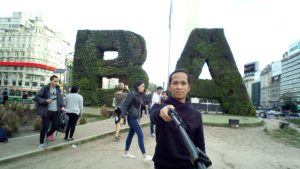Individuals who can show that they have enough external income to sustain themselves in Argentina can obtain renewable one-year residence permits through the Rentista and Pensionado visas. While the official minimum monthly income requirement is ARS30,000 (approximately US$300), immigration authorities usually expect applicants to exhibit an income exceeding US$2,000. This income can come from sources such as a pension, rental income, dividends, or other consistent and self-sufficient revenue streams.
Interestingly, while permanent residency (PR) and citizenship are regulated by different laws in Argentina, the period required to become eligible for naturalization is actually shorter (2 years) than that needed to obtain PR.
General program requirements
The Rentista and Pensionado visas provide temporary  residency permits that are valid for one year initially and can be renewed annually for up to three years. Holders of these permits are not permitted to work for an Argentine company, but they are allowed to engage in freelance work for international clients or start their own business in Argentina.
residency permits that are valid for one year initially and can be renewed annually for up to three years. Holders of these permits are not permitted to work for an Argentine company, but they are allowed to engage in freelance work for international clients or start their own business in Argentina.
While the officially mandated monthly income requirement is ARS 30,000 (equivalent to about US$300) from a guaranteed source, applicants are typically expected to exhibit an independent income of at least US$2,000 per month to secure approval. The applicant may also include a spouse and children under 25 years of age.
Additional fees:
$250 application fee
$600 immigration fee
Salient Benefits :
Program benefits
No investment or donation requirement
Visa-free movement throughout MERCOSUR
Path to citizenship
Permits dual/multiple citizenships
Lower cost of living
Warm climate
Enhanced business access to large economies
Short processing time
Path to Citizenship:
Requirements to qualify for citizenship:
To renew the residency permit, the applicant must submit a renewal application three months before its expiration date. After two years of continuous residency in Argentina, the applicant can apply for citizenship.
While there is no specific physical presence requirement stated in the legislation, applicants must demonstrate the legitimacy of their residency. Experts recommend spending at least 180 days per year in Argentina and showing ties to the country to establish that Argentina is the applicant’s de facto home.
No language or integration exams are required for naturalization, and Argentina allows dual citizenship. The decision to grant citizenship is at the discretion of an Argentinean judge, who has significant individual authority over the process. It is therefore advisable to enlist the assistance of experienced Argentine legal counsel.
Program Authority
Applications for this program may be directed to: Dirección Nacional de Migraciones
Program Legal Basis
Legislation upon which this program is based: Act no 25.871, Dto. 616/2010, Dto. 70/2017
Program Statistics:
No statistics available yet for this program.


